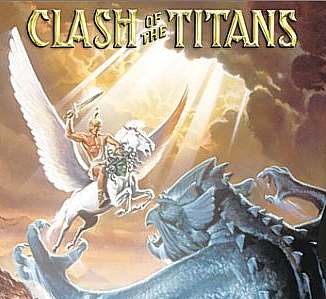"This is the account that I read, and not far from the tomb is the temple of Athena Chalinitis (Bridler). For Athena, they say, was the divinity who gave most help to Bellerophontes, and she delivered to him Pegasus, having herself broken in and bridled him" Pausanias
In Greek mythology, Pegasus, or Pegasos (Πήγασος) was a winged horse that was the foal of Poseidon, in his role as horse-god and the Gorgon Medusa.
Descriptions vary as to the winged stallion's birth and his brother the giant, Chrysaor; some say that they sprang from Medusa's neck as Perseus beheaded her, a "higher" birth, like the birth of Athena from the head of Zeus. Others says that they were born of the earth as Medusa's blood spilled onto it, in which case Poseidon would not be their sire. Minerva caught and tamed Pegasus, and presented him to the Muses.
The word Pegasos is derived from the Greek for the word spring, and everywhere the winged horse struck hoof to earth, an inspiring spring burst forth: one on the Muses' Mount Helicon, the Hippocrene ("horse spring"), at the behest of Poseidon to prevent the mountain swelling too much and another at Troezen.
Mounted on Pegasus, and with the Gorgon's head safely in his magical bag, Perseus was completed as a hero, and was ready to win Andromeda.
Pegasus aided the hero Bellerophon, who is a double in some way for Perseus, in his fight against both the Chimera and the Amazons. There are varying tales as to how Bellerophon found Pegasus, some say that the hero found him drinking at the Pierian spring and that Polyidus told Bellerophon how to find and tame him, others that either Athena or Poseidon brought him to Bellerophon.
Athena Chalinitis with Pegasus.
Medusa with a Pegasus head, from a red figure Amphora now in Naples, probably a symbol of the birth of Pegasus
Pegasus 10 Drachmae Coin 1973, Right Side the Phoenix
Pegasus Fountain, Tivoli, Villa d'Este
Pegasus, Poznan Opera
Prior to aiding Bellerophon, Pegasus brought thunderbolts to Zeus, and following Bellerophon's death he returned to Mount Olympus to aid the gods. In his later life, Pegasus took a wife, Euippe (or Ocyrrhoe), by whom he had two children, Celeris and Melanippe. This family is the origin of the winged horses.
Pegasus was eventually turned into a constellation, but a single feather fell to the earth near the city of Tarsus (hence its name).

The legend of Perseus was the basis for the film Clash of the Titans, the last movie to feature Ray Harryhausen's stop motion special effects.
Four Muses and Pegasus on Parnassus , Cesar B. van Everdingen
Bellerophon, Alexander Ivanov c. 1829
Muse on Pegasus Odilon Redon
Pegasus, Alte Oper, Frankfurt, Germany
Perseus on Pegasus Hastening to the Rescue of Andromeda
The Pegasus Panel, Bruno Louis Zimm
Music
Adam Guettel, Pegasus (1998), Myths And Hymns
Mythology Images
Retrieved from "http://en.wikipedia.org"
All text is available under the terms of the GNU Free Documentation License

 Disclaimer
Disclaimer  Privacy Policy
Privacy Policy